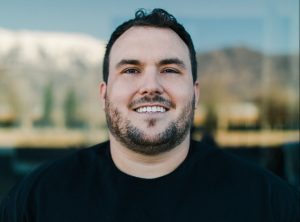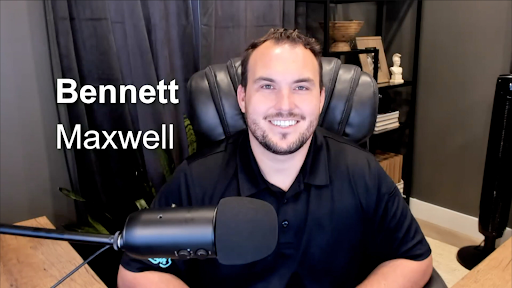Entrepreneurs today, more than ever before, face growing challenges and economic uncertainty. That, coupled with the “hustle and grind” mentality that’s been a mantra of the business community for decades now, has predictably led to a mental health crisis simmering just below the surface.
Small business owners are hit the hardest because they often wear many hats in their companies, so they’re forced to take on a significantly larger workload than employees do, and unlike employees, they don’t have the luxury of leaving work at work when the day ends. This leads to anxiety, depression, burnout, and a complete imbalance between work and life.
Serial entrepreneur, Bennett Maxwell, learned this first hand when he began to reevaluate his own work/life balance. After several successful launches and exits, and while running his latest venture, he began to realize he was facing burnout because he was constantly working and not investing enough time to take care of his own wellbeing. So despite running a large and rapidly growing company at the time, he began to step away more often to create the balance he knew he needed for his own mental health. That’s when he realized that if he was in this position, other entrepreneurs surely were too, and that’s when the Deeper Than Dough podcast was born, with a name, much like the topics covered, that goes deeper than it appears.

At first glance, the name is a seemingly obvious reference to the company he currently runs, Dirty Dough, which is a national franchise cookie company, but hidden just below the surface is the real meaning of the name—the conversations on the podcast are much deeper than just business, they’re about finding real meaning and fulfillment in life, and creating impact beyond money.
“Entrepreneurs are the kind of people who focus intensely on their goals in order to get things done, and as a result, they often overlook self care. That hurts them, but it also hurts everyone around them, including their family, employees, and communities. The ripple effect from that negatively impacts far more people than most ever realize.”
Maxwell said that he felt a calling to do his part by addressing the mental health and work/life balance aspects of entrepreneurship so that entrepreneurs could lead happier and more productive lives, and have a greater positive impact not just in their own businesses, but also in their local communities.
“When an entrepreneur handles stress poorly, they become burned out, anxious, and depressed, which leads to inefficiency and poor decisions, putting their business at risk. On the other hand, when they better understand how to manage stress and they have a good work/life balance, they become healthier, more effective, and build stronger businesses,” Maxwell explains. He goes on to say, “Beyond the direct benefit to the entrepreneur, and the indirect benefit to everyone connected to the company, reframing how we address mental health also helps by modeling a healthy approach for the next generation of entrepreneurs. And hopefully, in doing that, we can change the mindset around entrepreneurship from the 24/7 hustle and grind model to a healthier, more sustainable model that prioritizes mental health and work/life balance.”
Deeper Than Dough explores the toll of entrepreneurship
While the Deeper Than Dough podcast is still relatively new, it already boasts a roster of some of the top business leaders of our day, sharing not only the stories of their own journeys and the business lessons they learned from them, but also the emotional impact their journey had on them.
Maxwell comes to the table as a serial entrepreneur who has faced his share of ups and downs throughout his career, and he interviews other business leaders with similar backgrounds. It’s a down and dirty conversation about their journey and what they’ve done right and wrong throughout that journey, but more importantly, it’s about the impact that had on their own mental health and how they addressed that. This gives listeners valuable advice that helps them to build better mental health, deeper relationships, and stronger, more resilient businesses that have a greater impact in the world. He says it’s his way of using his success in business to give back to other entrepreneurs, and even to the world as a whole.
“I am blessed to have achieved a lot during my career so far, but I also know I could have achieved more, and in some ways, I could have had a more balanced life had I done things a little differently. Since I’m in a position where I’m able to give back by sharing this knowledge, I feel that it’s my obligation because entrepreneurship is about more than just money—it’s also about building a life you love and creating true impact for others. That’s why the Deeper Than Dough podcast has quickly become the part of my life I’m most passionate about,” he explains.
Data tells us this topic needs to be addressed, with over 21% of Americans experiencing some degree of mental health challenges, and 6.7% of these people facing substance abuse disorder, according to research from the National Alliance on Mental Illness. The problem is even bigger for entrepreneurs, with 72% of entrepreneurs dealing with some kind of mental-health issue. Of the entrepreneurs they studied, 30% had a history of depression, 19% had ADHD, 12% had substance abuse issues, and 11% reported having bipolar disorder. And with growing inflation, supply chain issues, tightening credit, and declining consumer confidence, that problem is likely going to become worse in the coming years.
Clinical psychotherapist, Dr. Fern Kazlow, who specializes in working with entrepreneurs and CEOs explains, “Entrepreneurs are driven to take control, to make things happen, and in the current environment there are many factors they can’t control or even plan for. And the isolation of being at the top, the fear of shame and humiliation, letting their family, employees, clients and customers down, takes a significant toll too. Many feel trapped, which is especially frustrating for freedom-loving entrepreneurs. While entrepreneurs may seem to thrive on high stress, it takes a toll on their mental health which hinders their ability to make effective decisions, lead their teams, and build successful companies.”
She says the good news is that there has been a substantial shift in thinking when it comes to mental health, particularly within the business community, where for far too long, entrepreneurs have simply pushed their emotions down until they snowballed to the point of severe negative impact on themselves and their companies. This leads to burnout, health problems, relationship issues, and in many cases, even mental breakdown.
“Seeking help for their well-being is becoming more common and valued. Accepting that things may be beyond what they are used to controlling, or that they aren’t superhuman, can be a major step toward reducing anxiety and depression, and regaining a sense of control, confidence, and the capacity to deal with whatever lies ahead. Self-care and finding the work/life balance that’s right for them is essential in today’s business environment,” Kazlow, explains.
She said that while she believes in the importance of seeking professional help, also says that people can also learn a lot from fellow entrepreneurs who have already successfully navigated these challenges, and that makes discussions like those on Maxwell’s podcast powerful for entrepreneurs committed to improving their mental health, building more effective and resilient companies, and creating a more fulfilling life.
Brianna Ruelas is a Dallas-based Account Executive and Strategy Consultant at Grit Daily. She is a Speaker, Reality TV Music Coach, Singer-Songwriter, and Best Selling Author to Make Reality TV Your Reality. Most recently, Brianna launched the Reality Singing Show Success Academy to help independent performing artists prepare for and maximize their experience on a reality singing show to create momentum in their music careers.
Credit: Source link


Comments are closed.